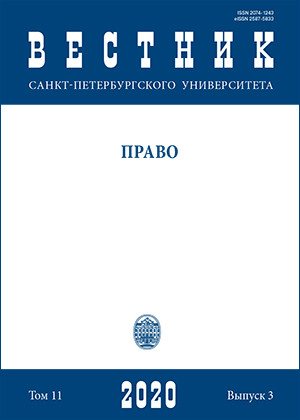Waiver of rights in Russian criminal procedure: Issues of theory, legislative regulation, and law enforcement
DOI:
https://doi.org/10.21638/spbu14.2020.308Abstract
The article discusses the waiver of procedural rights as a particular legal phenomenon. The rationale for studying the waiver of rights in the Russian criminal procedure doctrine arises from the expansion of the spheres of disposition and adversarial nature in present-day Russian criminal procedure. In order to form an overall picture of the ‘waiver of rights’, the article describes its distinctive features and elements that characterize it. Additionally, the theoretical aspects of the waiver of rights in present-day Russian criminal procedures, as well as the legal regulation of a waiver, are analyzed. A waiver of subjective rights is understood as an expression of a legal person’s will in terms of failure to behave as provided for by objective law, which is characterized by voluntariness, awareness, and freedom of choice. It is asserted that any non-realization of rights by a subject is not considered a waiver. The difference is demonstrated in the understanding of the concept ‘waiver of rights’ in the approaches of the European Court of Human Rights, the Constitutional Court of the Russian Federation, as well as in the interpretation of the rules of criminal procedural legislation, which regulates a person’s ability to waive the rights granted to them by the Supreme Court of the Russian Federation. The article states that the disposition principle of legal regulation, applied by the legislator to participants in criminal proceedings defending their personal interests, presupposes the legislatively established possibility of a person to refuse to exercise the right unless it violates the more important public interest. Attention is given in the article to the necessity of guarantees that ensure voluntariness, awareness, and freedom of choice in case of a person’s waiver of their rights.
Keywords:
subjective right, waiver of right, refusal to exercise a right, disposition in criminal procedure, defendant’s waiver of counsel, involuntary waiver of rights, forms of waiver
Downloads
References
Downloads
Published
How to Cite
Issue
Section
License
Articles of "Vestnik of Saint Petersburg University. Law" are open access distributed under the terms of the License Agreement with Saint Petersburg State University, which permits to the authors unrestricted distribution and self-archiving free of charge.






